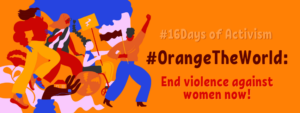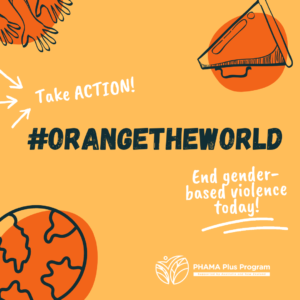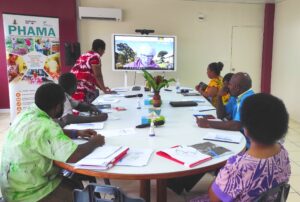In focus: 16 Days of Activism against Gender-based Violence

The social and economic context for gender-based violence is characterised by gender inequality and other forms of intersecting inequalities.
Worldwide nearly 1 in 3 women have experienced physical or sexual violence – most often by an intimate partner. In times of crises, the numbers rise, as seen during the COVID-19 pandemic and recent humanitarian crises, conflicts and climate disasters. The latest figures from UN Women, based on data from 13 countries since the pandemic, confirm that almost half of all women reported that they or a woman they know began to experience gender-based violence during the pandemic.
The Pacific Horticultural and Agricultural Market Access Plus Program (PHAMA Plus) works to ensure that improved economic growth and livelihoods tackle gender inequality and are inclusive of and benefit women, people with disability (PWD), youth and people living in remote communities. Our work is guided by the PHAMA Plus Gender Equality, Disability and Social Inclusion (GEDSI) Strategy which aims to make a valuable and measurable contribution to the overall end of program outcomes, including addressing many of the gendered drivers of gender- based violence and to mitigate gender-based violence risks to women and girls in the agricultural value chain.
In the Pacific, women are key economic drivers contributing to economies in a range of important ways. But women’s livelihoods are disproportionately affected by the COVID-19 pandemic and in addition to the rises in gender-based violence they are also experiencing increased unemployment and economic insecurity. Women overall earn less than men and are more likely to work in low-paying, informal and precarious work. Women in the Pacific are therefore particularly vulnerable to the impacts of COVID-19 on the current economic system, long after the initial emergency is over.
As a lead up to 16 days of activism, PHAMA Plus organised sessions on Anti-sexual harassment (ASH) and Family Sexual Violence (FSV) for PHAMA Plus staff, partners and stakeholders as part of our membership of the PNG Business Coalition for Women (BCFW). Both sessions have highlighted the cost to businesses as a result of ASH and FSV and why it makes business sense to invest in creating a safe and enabling work environment.
Here are some other examples of PHAMA Plus’ efforts to tackle gender inequality and other forms of intersecting inequalities that provide the underlying conditions for gender-based violence:
Addressing adverse cultural norms
- In most Papua New Guinea (PNG) communities, it is the men who own the pigs, build the fences and provide fuel to cook food for the animals. It is the women who care for the pigs every day. Pigs are a central part of PNG’s culture and are regularly traded to seal marriages or end disputes. There are serious concerns that mass pig deaths could cause social and economic upheaval in the country with the presence of African Swine Fever (ASF). PHAMA Plus supported the National Agriculture and Quarantine Inspection Authority (NAQIA)’s response work and awareness efforts to contain the pig killing disease. A key part of the work was to raise awareness that ASF was caused by a virus and not sanguma (black magic). The current proactive mass information campaign has been sustained to manage and mitigate sorcery related or gender-based violence. PHAMA Plus also acknowledges the work of other key players in establishing a strong platform for addressing sorcery related violence such as the Human Rights Defenders.
- In Vanuatu, our partner Gaston Chocolat prioritises training and resourcing for female farmers. This is helping to create an enabling environment for women in the cocoa sector;
- Across several interventions in Tonga, Fiji, Samoa and Vanuatu, emphasis has been placed on supporting the greater participation of women as agricultural extension officers, an occupation that is traditionally associated with men.

Strengthening visibility, voice and representation of women, PWD and youth
- Supporting the PNG Women in Coffee Association (WICA) to complete their Strategic Plan in May 2021. The organisation is now proceeding to affiliate with the International Women’s Coffee Association (IWCA), with a target of membership by the end of 2021;
- In PNG, membership of the PNG Business Coalition for Women (BCFW) is being offered to all partners in the coconut, coffee and cocoa sectors as well as in biosecurity.
- In PNG, a Women’s Desk has been set-up at the Coffee Industry Corporation to provide a dedicated access point for services and support. The same will be done at Kokonas Indastri Koporesen (KIK);
- At Paradise Foods Ltd., training in sign-language will be delivered to 10 staff. As part of the partnership, a person with disability has already been recruited to the laboratory staff;
- With the Solomon Islands Chamber of Commerce and Industries (SCCI), an online ‘digital brokerage’ platform will feature social stories of female exporters and farmers, to raise their profile and provide increased opportunities for export sales;
- As part of our support to Milne Bay Organics in PNG, ten youths and five people with disability will be trained in coconut-based product development, packaging and marketing;
- In the coconut sector in the Solomon Islands, Solomon Tropical Products supports small-scale coconut producers and provides employment to 12 men and 25 women. The company is led by a woman;
- Our partnership with The Kava House partnership in Vanuatu, one of the company’s key buying agents is female and the Kava house owners (husband and wife team) are strong advocates for involvement of women in the kava industry. Vanuatu Wise, another potential partner that the team is engaging with, is owned by a woman who is a committed exporter and business leader.
Changing business culture and practice
- In Fiji with Lami Kava, the development of a new work-place policy aims to create a more supportive environment for women, including in relation to domestic violence;
- The ‘digital brokerage’ intervention with SICCI will strengthen the leadership role and visibility of SCCI’s female CEO and further encourage female and youth participation in businesses.
Build assets and access to assets for women, PWD and youth in the sector
- In Vanuatu, under the partnership with South Sea Commodities, access to solar dryers that are not only more effective and environmentally friendly, but their design makes it accessible for all, including for women, youth and people with disabilities, to assemble and use them.
Family Farm Teams training

The Family Farm Teams (FFT) training approach seeks to understand the relationship between smallholder farming, the unequal division of labour and gender equity and to empower families to work together as a team and earn enough money to pay for important ongoing living expenses such as education and healthcare. It facilitates the shift from semi-subsistence farming to more planned farming operations. FFT supports male and female household heads to work together to plan agricultural activities and other farm/social commitments, and work towards equitable and shared responsibilities across the ‘family farm team’. It also helps families to learn to plan and make decisions together. PHAMA Plus took a training-of-trainers (ToT) approach to build a pool of trained resources across all PHAMA Plus countries. Since April 2021, a total of 125 participants attended the FFT ToT training of which 75 are male, including 4 male youth and 50 women including 2 female youth and one woman with disability across five (5) PHAMA Plus countries. More activities are planned and successful roll-out of the program.
Take action now
While pervasive, gender-based violence is not inevitable. It can and must be prevented. Stopping this violence starts with believing survivors, adopting comprehensive and inclusive approaches that tackle the root causes, transforming harmful social norms, and empowering women and girls. With survivor-centred essential services across policing, justice, health, and social sectors, and sufficient financing for the women’s rights agenda, we can end gender-based violence (GBV).
The 16 Days of Activism against Gender-Based Violence is an annual international campaign that kicks off on 25 November, the International Day for the Elimination of Violence against Women, and runs until 10 December, Human Rights Day.
You can take action during the 16 Days of Activism. Here are some ideas:
10 ways you can help end violence against women, even during a pandemic: https://un-women.medium.com/take-action-10-ways-you-can-help-end-violence-against-women-even-during-a-pandemic-6f0ec0057aa6
Learn the types of violence against women and girls: https://www.unwomen.org/en/what-we-do/ending-violence-against-women/faqs/types-of-violence
Facts and figures: Ending violence against women: https://www.unwomen.org/en/what-we-do/ending-violence-against-women/facts-and-figures
The signs of relationship abuse and how to help: https://www.unwomen.org/en/what-we-do/ending-violence-against-women/faqs/signs-of-abuse
Download the social media package and #orangetheworld #16days: https://trello.com/b/LazSoGkN/16-days-of-activism-2021

